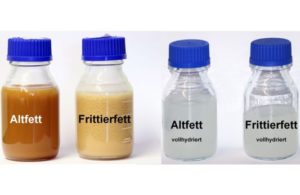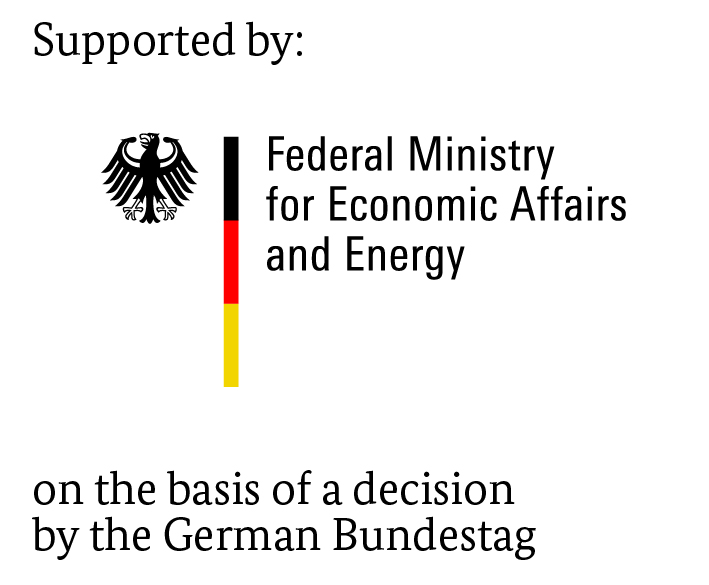Residual and waste materials as raw material basis

Hydrogenation turns used fats into fuel for oil heating systems. Used grease and deep-frying grease before hydrogenation (left) and after (right). Photo: OWI
04 February 2020 –
The use of biogenic residual and waste materials for the production of alternative heating oil could make the operation of oil heating systems more sustainable and climate-friendly. Secondary raw materials such as tall oil, grease separator residues or used frying oils could be used for this purpose. Through the production processes of hydrogenation and isomerisation, they acquire chemical-physical properties that are very similar to those of heating oil according to DIN 51603-1. This results in good combustion properties of these hydrogenated bio-oils, which enable their use in existing oil heating systems.
These are two of the most important results of a joint research project on “drop-in-capable hydrogenated bio-oils for middle distillate applications” carried out by the Institute of Energy Process Engineering and Chemical Engineering at the TU Bergakademie Freiberg (IEC) and the OWI Oel-Waerme-Institut gGmbH. In hydrogenation, biogenic oils are converted by a catalytic reaction with hydrogen into hydrocarbons that have similar properties to heating oil. Through isomerisation, these hydrocarbons obtain better cold stability, so that they remain liquid even at ambient temperatures below -12 °C.
The investigations focused in particular on the comparison of different production processes and raw materials with regard to the application properties of the resulting bio-oils. These included on the one hand the joint hydrogenation and subsequent isomerisation of vegetable oil and crude oil-bearing middle distillates in co-processing and on the other hand the stand-alone hydrogenation and isomerisation of pure vegetable oil, which was subsequently mixed with conventional heating oil. As a result, both paths led to fuels that conformed to standards. The application-technical investigations of these biogenic fuels, which originate from different production processes, on a special circulation test bench showed that the production process had a significant influence on the product quality and on potential interactions in mixtures with heating oil.
The co-processing products were well suited for blending with heating oil. No signs of deposits were found and the accompanying chemical analyses of the fuels were also inconspicuous. During co-processing, the addition of up to 20 % rapeseed oil by volume proved to be effective in producing sufficiently cold-resistant heating oil.
 The IGF project 18671 BG of the research association German Society for Petroleum and Coal Science and Technology e.V. – DGMK, Überseering 40, 22297 Hamburg is funded through the AiF as part of the program for promoting joint industrial research (IGF) by the German Federal Ministry of Economics and Energy based on a German Federal Parliament resolution.
The IGF project 18671 BG of the research association German Society for Petroleum and Coal Science and Technology e.V. – DGMK, Überseering 40, 22297 Hamburg is funded through the AiF as part of the program for promoting joint industrial research (IGF) by the German Federal Ministry of Economics and Energy based on a German Federal Parliament resolution.





